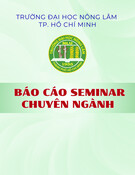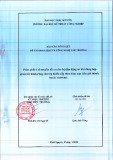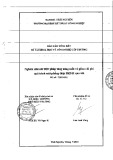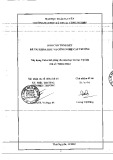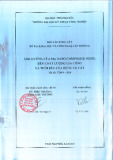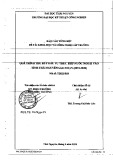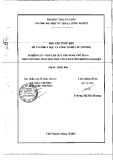STATEMENT OF AUTHORSHIP
I declare that my thesis entitles: “Applying role-play in increasing student’
interest in learning speaking to grade 11 students at Lai Vung 2 high school” is the
result of my own work, submitted in the fulfillment for the requirements of the B.A
degree. Except where the reference is indicated, no others person's work has been used
without due acknowledgement in the text of the thesis.
The author
Le Dinh Mai Thao
i
ACKNOWLEDGEMENTS
During the process of carrying out the study, I have received a large amount of
contribution and support from many people.
First, I would like to express my deepest gratitude to my supervisor, M.A. Ngo Ai
Tuong, for her enthusiastic and useful guidance, insightful comments, and
encouragement without which my thesis would not have been completed.
Second, my special thanks go to all of the teachers in Foreign Language Department
who provided me with necessary help as well as good suggestion whenever I got into
trouble.
Next, I am grateful to the teachers of English, who answered my questionnaire and
interviewing questions, especially, Ms. Trinh Thi Hong Cam and Mr. Vo Minh Trung,
who allowed me to carry out my observation and the students at Lai Vung 2 High
school for what they have done to help me finish the thesis.
Last but not least, I would like to express my special thanks to my family, my friend
and so many others who have given me constant support and love during the
completion of the study.
Le Dinh Mai Thao
ii
ABSTRACT
Using role-play activity is an effective way that helps to increase students'
interest in learning speaking. When applying role-play, students are set into an
interesting talking environment, therefore, they can be activated to talk as more as
possible .The study about applying role-play in increasing students' interest in learning
speaking is carried out to identify how students interest in learning speaking as well as
role-play activity. Data used for analysis in this study is mainly collected through
survey questionnaires, through observation of two classes whose teachers have applied
this activity and through direct interviewing. One of the prominent results from data
analysis is that students at Lai Vung 2 High school really interest in learning speaking
whenever applying role-play. The usefulness and difficulties of applying this activity
are mentioned in this thesis. Some solutions for overcoming these difficulties are also
suggested.
iii
TABLE OF CONTENTS
STATEMENT OF AUTHORSHIP ............................................................................... i
ACKNOWLEDGEMENTS ........................................................................................... ii
ABSTRACT ................................................................................................................... iii
TABLE OF CONTENTS .............................................................................................. iv
LIST OF TABLES ....................................................................................................... vii
CHAPTER ONE: INTRODUCTION ........................................................................... 1
1.1. Motivation for the study ...................................................................................... 1
1.2. Aims of the study .................................................................................................. 2
1.3. Research methods ................................................................................................. 2
1.4. Scope of the study ................................................................................................. 2
1.5. Significance of the study ...................................................................................... 2
1.6. Previous related studies ....................................................................................... 2
1.7. Organization of the study .................................................................................... 3
CHAPTER TWO: LITERATURE REVIEW .............................................................. 4
2.1 Teaching and learning English speaking skill .................................................... 4
2.1.1 Communicative language teaching approach – an effective language teaching
method........................................................................................................................ 4
2.1.1.1 Definition of communicative language teaching approach ....................... 4
2.1.1.2 The goal of communicative language teaching approach .......................... 4
2.1.2 The way of learning English speaking effectively ........................................... 5
2.2 Role-play in teaching speaking ............................................................................. 6
2.2.1 Definition of role-play ...................................................................................... 6
2.2.2 The steps for role-play activity ......................................................................... 7
2.2.3 The significance of role-play in teaching speaking ........................................ 10
2.2.4. The teacher‟role in this activity. .................................................................... 10
CHAPTER THREE: METHODOLOGY ................................................................... 12
3.1 Research questions: ............................................................................................. 12
3.2. Research participants ......................................................................................... 12
3.2.1. The researcher ................................................................................................ 12
iv
3.2.2. The subjects ................................................................................................... 12
3.3. Research procedure ............................................................................................ 12
3.4. Data collection instruments ............................................................................... 12
3.4.1. Survey questionnaires .................................................................................... 13
3.4.2. Observations .................................................................................................. 13
3.4.3. Interview ........................................................................................................ 14
CHAPTER FOUR: RESULTS AND DISCUSSION ................................................. 16
4.1. Results analysis ................................................................................................... 16
4.1.1. Questionnaires ............................................................................................... 16
4.1.1.1. Questionnaire for students ...................................................................... 16
4.1.1.2. Teacher questionnaire ............................................................................. 31
4.1.2. Interviewing ................................................................................................... 41
4.1.2.1. Teachers' interviewing ............................................................................ 41
4.1.2.2. Students' interviewing ............................................................................. 42
4.1.3. Observation .................................................................................................... 43
4.1.3.1. The first observed class ........................................................................... 43
4.1.3.2. The second observed class ...................................................................... 44
4.2. Discussion ............................................................................................................ 46
4.2.1. Research question 1: What attitude do teachers and students have toward
learning speaking English and role-play activities? ................................................ 46
4.2.1.1. Students' attitude toward learning speaking English. ............................. 46
4.2.1.2. Teachers and students' attitude toward role-play activities. ................... 46
4.2.2. Research question 2: What are the effectiveness and difficulties of applying
role-play? ................................................................................................................. 47
4.2.2.1. The effectiveness of applying role-play. ................................................. 47
4.2.2.2. The difficulties of applying role-play. .................................................... 47
4.2.3. Research question 3: What should be done to overcome the difficulties of
applying role-play? .................................................................................................. 48
4.2.3.1. The advices for teachers. ......................................................................... 48
4.2.3.2. The advices for students .......................................................................... 48
v
CHAPTER FIVE: CONCLUSION ............................................................................. 50
5.1. Overview of the thesis ........................................................................................ 50
5.2. Limitations of the thesis ..................................................................................... 50
5.3. Suggestions for further research ....................................................................... 51
REFERENCES ................................................................................................................ I
APPENDIX 1 ................................................................................................................. III
QUESTIONNAIRE ................................................................................................... III
APPENDIX 2 .................................................................................................................. V
BẢNG CÂU HỎI ........................................................................................................ V
APPENDIX 3 ................................................................................................................ IX
OBSERVATION SHEET ........................................................................................ IX
vi
LIST OF TABLES
Tables of students'questionnaire analysis
Table 1: Students' attitude about speaking English ......................................................... 16
Table 2: Students' thought about learning speaking ....................................................... 17
Table 3: Students' speaking ability .................................................................................. 18
Table 4: The frequencies of teachers' applying role-play ............................................... 19
Table 5: Students' thought about the way that teachers apply role-play ......................... 20
Table 6: Students' thought about role-play activities ...................................................... 21
Table 7: Students' opinion about the profit of participating in role-play ..................... 22
Table 8: Students' benefits when participating in role-play activities ............................ 23
Table 9: Students' interest in their role ........................................................................... 24
Table 10: Students' advantages when participating in role-play activities ..................... 25
Table 11: Student's difficulties when participating in role-play activities ..................... 26
Table 12: The students' preferences about the topics of role-play activities ................. 27
Table 13: Students' opinions about their teacher's instruction ........................................ 28
Table 14: The increasing of students' interest in learning speaking .............................. 29
Table 15: The improvement of students' speaking ability .............................................. 30
Tables of teachers'questionnaire analysis
Table 1:Teachers' opinion about their students' attitude about learning speaking .......... 31
Table 2: Teachers‟ opinion about their students' speaking ability .................................. 32
Table 3: Teachers have applied role-play activities ........................................................ 33
Table 4: Teachers‟ opinion about applying role-play in increasing students' interest in
learning speaking ............................................................................................................ 34
Table 5: The usefulness of role-play activities ............................................................... 35
Table 6: Teachers' frequency of applying role-play activities ........................................ 36
Table 7: Teachers' opinion about whether applying role-play is difficult or not ............ 37
Table 8: Teachers' difficulties when applying role-play activities ................................ 38
Table 9: Teachers' thought about the increasing of their students' interest in learning
speaking ........................................................................................................................... 39
Table 10: Teachers' opinion about their students' speaking ability improvement ......... 40
vii
LIST OF FIGURES
Figures of students' questionnaire analysis
Figure 1:Students' attitude about speaking English ....................................................... 16
Figure 2:Students' thought about learning speaking ...................................................... 17
Figure 3: Students' speaking ability ............................................................................... 18
Figure 4: The frequencies of teachers' applying role-play ............................................. 19
Figure 5: Students' thought about the way that teachers apply role-play ...................... 20
Figure 6: Students' thought about role-play activities ................................................... 21
Figure 7: Students' opinion about the profit of participating in role-play .................... 22
Figure 8: Students' benefits when participating in role-play activities .......................... 23
Figure 9: Students' interest in their role ........................................................................ 24
Figure 10: Students' advantages when participating in role-play activities .................. 25
Figure 11: Student's difficulties when participating in role-play activities .................. 26
Figure 12: The students' preferences about the topics of role-play activities ................ 27
Figure 13: Students' opinions about their teacher's instruction ..................................... 28
Figure 14: The increasing of students' interest in learning speaking ............................ 29
Figure 15: The improvement of students' speaking ability ........................................... 30
Figures of teachers' questionnaire analysis
Figure 1: Teachers' opinion about their students' attitude about learning speaking ..... 31
Figure 2: Teachers‟ opinion about their students' speaking ability .............................. 32
Figure 3: Teachers have applied role-play activities ..................................................... 33
Figure 4: Teachers‟ opinion about applying role-play in increasing students' interest in
learning speaking ............................................................................................................ 34
Figure 5: The usefulness of role-play activities ............................................................. 35
Figure 6: Teachers' frequency of applying role-play activities ...................................... 36
Figure 7: Teachers' opinion about whether applying role-play is difficult or not ........ 37
Figure 8: Teachers' difficulties when applying role-play activities .............................. 38
Figure 9:Teachers' thought about the increasing of their students' interest in learning
speaking ........................................................................................................................... 39
Figure 10: Teachers' opinion about their students' speaking ability improvement ........ 40
viii
CHAPTER ONE: INTRODUCTION
This chapter introduces some very first parts of the thesis; there are seven parts in
this chapter: (1) motivation for the study; (2) aims of the study; (3) research methods;
(4) scope of the study; (5) significance of the study; (6) previous related studies and (7)
organization of the study.
1.1. Motivation for the study
Speaking skill is one of important parts of learning English. Everyone who learns
English always want to use this skill as well as they can. Speaking English fluently is
the key that lets people can be easier to communicate with foreigners, accept the
advance of technology and get success. However, sometimes, speaking is also the
obstacle that obstructs them to reach to their aims. In fact, a lot of learners study
English grammar very well, but they cannot master it just because they get difficulties
in their speaking. This problem leads to disheartenment for learners so they lose their
interest in learning speaking.
In Vietnam, especially in many countryside schools, speaking skill usually is
neglected. Teachers spend almost all class time for teaching grammar; therefore,
students lack the chances to practice speaking (Nguyen Quoc Hung, M.A). In others
case, speaking classes are the time for learning by heart dialogs or practicing repetition
of drills. Students cannot cavalier this drills in their real conversations. The result is
more and more students lose their belief in their ability of speaking English.
To improve student‟s communicative skills, increasing student‟s interest in
speaking is very useful. The more interesting atmosphere the teachers create the more
effectiveness in oral skills the students get. Role- play activity is one of the best ways
that can help teachers carry out this. Since teachers apply role- play activities in class,
students are activated because they are set into an interesting speaking environment.
For these reasons above, the researcher decide to carry out the thesis “Applying
role-play in increasing student‟ interest in learning speaking to grade 11 students at Lai
Vung 2 high school”. Through this thesis, researcher hope that it helps high school
1
teachers realize the usefulness of role-play activity as well as suggest some solutions to
increase the effectiveness of this activity in speaking class.
1.2. Aims of the study
The thesis aims to identify how students interest in learning speaking. The thesis, in
addition, aims to find out the effect of using role-play in speaking classes. Also, it is
intended to find out difficulties from using role-play activities so that the researcher
can suggest some solutions to these difficulties.
1.3. Research methods
During studying process, there are three research methods which are going to
collect valuable data and information: questionnaires, observation and interview.
Firstly, the questionnaires are employed. In order to collect the data, two types of
questionnaires are designed: one in English and the other in Vietnamese. The English
questionnaire is delivered to four teachers, who teach in grade 11 and the Vietnamese
one is used for students. Collected data will be analyzed to realize how role-play is
applied and the effect of using role-play in class. Next, personal observations are also
carried out in some classes, which role-play is applied to observe teachers and students'
role-play activities. Furthermore, interview is use to find out teachers and students
difficulties from using role-play.
1.4. Scope of the study
The scope of study is about applying role-play in increasing students' interest in
learning speaking to grade 11 students at Lai Vung 2 high school.
1.5. Significance of the study
Hopefully, the findings of the study may make a contribution to increase interest in
learning speaking English for student toward applying role-play activities. The thesis
also may help to find out what are the difficulties when teacher applying role-play.
Furthermore, it may not only help to find out the difficulties when teacher applying
role-play but also will give some suggestions to help teachers over come these
difficulties.
1.6. Previous related studies
2
In 2004, in the thesis " Rèn luyện kỹ năng nói tiếng Anh của học sinh khối lớp 10
trường THPT chuyên Thoại Ngọc Hầu thông qua hoạt động đối thoại và đóng kịch"
(Improving speaking English skill of the grade 10 students at Thoai Ngoc Hau high
school by using dialogs and role-play), Mach Buu Hien, students at An Giang
University has stated some definitions about dialog and role-play. The thesis has shown
the steps to carry out role-play activies. He also stated some advantages when teachers
apply this activity in teaching speaking. This study is very helpful because it provides
the theoretical background for the thesis.
1.7. Organization of the study
The thesis consists of five chapters
Chapter 1: Introduction, which presents an overview of the thesis in which
motivation for the research, aims, research methods, scope, significance , previous
related studies as well as the organize of the study are briefly presented.
Chapter 2: Literatures review, this chapter provides the theoretical background
relevant to the study including theory of teaching and learning English speaking and
role-play in teaching speaking.
Chapter 3: Methodology, this chapter focuses on presenting research questions,
research participants, research procedure, data collection as well as methods of
analysis.
Chapter 4: Results and discussions, this part presents the results of survey
questionnaires, observation and interview about teachers and students' attitudes
towards teaching and learning English speaking and applying role-play activities in
speaking classes.
Chapter 5: Conclusions, this is a chapter consisting of overview of the study, presents
the limitations of the study and provides some suggestions and implications for further
research.
3
CHAPTER TWO: LITERATURE REVIEW 2.1 Teaching and learning English speaking skill
2.1.1 Communicative language teaching approach – an effective language
teaching method.
2.1.1.1 Definition of communicative language teaching approach
"Communicative language teaching (CLT), or the communicative approach, is
an approach to language teaching that emphasizes interaction as both the means and the
ultimate goal of study." (www.wikipedia.org)
Communicative language teaching makes use of real-life situations that necessitate
communication. The teacher sets up a situation that students are likely to encounter in
real life. Unlike the audio-lingual method of language teaching, which relies on
repetition and drills, the communicative approach can leave students in suspense as to
the outcome of a class exercise, which will vary according to their reactions and
responses. The real-life simulations change from day to day. Students' motivation to
learn comes from their desire to communicate in meaningful ways about meaningful
topics.
Margie S. Berns, an expert in the field of communicative language teaching,
writes in explaining Firth's view that "language is interaction; it is interpersonal activity
and has a clear relationship with society. In this light, language study has to look at the
use (function) of language in context, both its linguistic context (what is uttered before
and after a given piece of discourse) and its social, or situational, context (who is
speaking, what their social roles are, why they have come together to speak)" (Berns,
1984, p. 5).
2.1.1.2 The goal of communicative language teaching approach
The main goal of communicative language teaching is to build, to make, and to
develop learners' communicative ability in the classroom and outside the classroom in
order to the learners to be active speakers without many thinking about grammatical
mistake. In other words, the main goal of this approach is to make an improvement of
the communicative competence, especially ability for speaking in the classroom or out
of class with other person by using oral language.
4
2.1.2 The way of learning English speaking effectively
Speaking is" the process of sharing meaning through the use of verbal and non-
verbal symbol, in a variety of context (Chaney, 1998, p.13). Learning English speaking
as second language is actually not easy for Vietnamese students. According to Margre
S.Berns again, "language is interaction, it is interpersonal activity and has a clear
relationship with society" (Berns, 1984.p.5). Therefore, learning speaking is not just a
process of imitation or repetition of drills. It requires a lot interaction between students.
In speaking classes, the more communicative activities students attend, the more
improvable speaking skills students get.
The main criterion for success in learning speaking is whether or not the learners
can communicate fluently in English. The below steps are some guidance that can
helps learners reach to this aim.
The first step is realizing the fact that learning the English language should not be a
duty or chore for the learners; it should be taken as a fascinating hobby that will help
learners to expand their horizons in many aspects of their life. One of the most
important aspects of improving spoken English is to have an extensive vocabulary so
that they could express their thoughts clearly and easily. Having a good stock of words
would help them to be more precise with their construction and more articulate with
their speech.
. Next, having knowledge of basic grammar is another very necessary component of
improving spoken English. It is not necessary to have an extensively detailed
knowledge of grammar for speaking fluent English. In fact, speaking in absolutely
correct grammar may sometimes lead to awkwardness in casual and informal
meetings or talks. So, learners just have a basic knowledge of grammar would be
enough to get learners started.
The other step is to be able to convey what they want to express in a confident and
easy manner. For this, learners need to believe in themselves. Also, do not hesitate to
ask the other persons for clarification if learners do not understand them or they
themselves are stuck on a word or two in the middle, and need some help.
5
Last but not the least, keep practicing.– Speaking English themselves as much as
they can and trying to understand the different accents of native English speakers are
two things that would take learners a long way in retaining what they learnt as well as
improving their spoken English skills. Watch English movies, news channels, etc. to
hear crisp English diction and absorb the different styles of pronunciations.
2.2 Role-play in teaching speaking
2.2.1 Definition of role-play
According to Paul Procter in Cambridge International Dictionary of English, role
defined as the person whom an actor represents in film or play, while role play is a
method of acting out particular way of behaving or pretending to be other people who
deal with new situations. It is used in training courses language learning and
psychotherapy.
In Role Play: Resources Book for Teacher Series, Gillian Porter Ladusse illustrated
that when students assume a "Role", they play a part (either their own or somebody
else's) in specific situation. "Play" means that is taken on in a safe environment in
which students are as an inventive and playful as possible.
Another definition is stated by Joanna Budden in British Council Teaching English
on her article with the title "Role Play" . She said that role-play is any speaking activity
when you either put yourself into somebody else's shoes, or when you stay in your own
shoes but put yourself into imaginary situation. What is meant by imaginary people is
that students can become anyone they like for a short time. The President, The Queen,
a millionaire, a pop star..., the choice is endless. Students can also take on the opinions
of someone else. 'For and against' debates can be used and the class can be split into
those who are expressing views in favor and those who are against the theme.
From those definitions above, the role play is described as a technique which
involves imagination to be someone else or to be ourselves in a specific situation for a
while, improvising dialog and creating a real world in scenario. Role –play activities
can encourage students' thinking and creativity, helps students develop and practice
new language and behavioral skills in a relatively non- threatening setting, and can
create the motivation and involvement necessary for learning to occur. Role-play is a
6
powerful and effective teaching method for children and adult and can be adapted to
deliver any learning objectives from simple to complex concepts. It really lends well to
practice communication skills, debate complex ethical issues or explore attitudes and
beliefs. The success lies in the construction and delivery with careful facilitation.
According to Don Byrn, role-play can be grouped into two forms. Scripted role-
play, which involves interpreting either the textbook dialog or reading text in the form
of speech is the first one. The main function of the text is after all is to convey the
meaning of language items in a memorably way. The second one is unscripted role-
play. In contrast of scripted role –play, the situation of unscripted role-play do not
depend on textbook. It is known as a free role-play. When participating in this form,
students themselves have to decide what language to use and how the conversation
should develop. In order to do this activity, good preparation from teacher and students
is really necessary.
2.2.2 The steps for role-play activity
In the book: Role-Play in Teaching Culture: Six Quick Steps for Classroom
Implementation, Maria A Kodotchigova suggest that there are six steps to making a
successful role-play.
Step 1- A situation for a role- play
To begin with, choose a situation for a role play, keeping in mind students' needs
and interests (Livingstone, 1983). Teachers should select role plays that will give the
students an opportunity to practice what they have learned. At the same time, role play
need to interest students. One way to make sure role play is interesting is to let the
students choose the situation themselves. They might either suggest themes that
intrigue them or select a topic from a list of given situations. Teachers might make up
an effective role play based on cultural differences.
Step 2 - Role Play Design After choosing a context for a role play, the next step is to come up with ideas on
how this situation may develop. Students' level of language proficiency should be
taken into consideration (Livingstone, 1983). If teachers feel that the role play requires
more profound linguistic competence than the students possess, it would probably be
7
better to simplify it or to leave it until appropriate. On low intermediate and more
advanced levels, role plays with problems or conflicts in them work very well because
they motivate the characters to talk (Shaw, Corsini, Blake & Mouton, 1980; Horner &
McGinley, 1990). To build in these problems let the standard script go wrong. This will
generate tension and make the role play more interesting. For example, in a role play
situation at the market the participants have conflicting role information. One or two
students have their lists of things to buy while another two or three students are
salespeople who don't have anything the first group needs, but can offer slightly or
absolutely different things.
Step 3 - Linguistic Preparation
At the beginning level, the language needed is almost completely predictable. The
higher the level of students the more difficult it is to prefigure accurately what
language students will need, but some prediction is possible anyway (Livingstone,
1983). It is recommended to introduce any new vocabulary before the role play
(Sciartilli, 1983).At the beginning level, teachers might want to elicit the development
of the role play scenario from students and then enrich it. For example, the situation of
the role play is returning an item of clothing back to the store. The teacher asks
questions, such as, 'In this situation what will you say to the salesperson?', 'What will
the salesperson say?' and writes what the students dictate on the right side of the board.
When this is done, on the left side of the board the instructor writes down useful
expressions, asking the students, 'Can the customer say it in another way?', 'What else
can the salesperson say?' This way of introducing new vocabulary makes the students
more confident acting out a role play.
Step 4 - Factual Preparation
This step implies providing the students with concrete information and clear role
descriptions so that they could play their roles with confidence. For example, in the
situation at a railway station, the person giving the information should have relevant
information: the times and destination of the trains, prices of tickets, etc. In a more
advanced class and in a more elaborate situation include on a cue card a fictitious
name, status, age, personality, and fictitious interests and desires. Describe each role in
8
a manner that will let the students identify with the characters. Use the second person
'you' rather than the third person 'he' or 'she.' If the role presents a problem, just state
the problem without giving any solutions.
Step 5- Assigning the Roles
Some instructors ask for volunteers to act out a role play in front of the class
(Matwiejczuk, 1997), though it might be a good idea to plan in advance what roles to
assign to which students. At the beginning level the teacher can take one of the roles
and act it out as a model. Sometimes, the students have role play exercises for the
home task. They learn useful words and expressions, think about what they can say and
then act out the role play in the next class.There can be one or several role play groups.
If the whole class represents one role play group, it is necessary to keep some minor
roles which can be taken away if there are less people in class than expected (Horner &
McGinley, 1990). If the teacher runs out of roles, he/she can assign one role to two
students, in which one speaks secret thoughts of the other (Shaw, Corsini, Blake &
Mouton, 1980). With several role play groups, when deciding on their composition,
both the abilities and the personalities of the students should be taken into
consideration. For example, a group consisting only of the shyest students will not be a
success. Very often, optimum interaction can be reached by letting the students work in
one group with their friends (Horner & McGinley, 1990).
Whether taking any part in the role play or not, the role of the teacher is to be as
unobtrusive as possible (Livingstone, 1983). He or she is listening for students' errors
making notes. Mistakes noted during the role play will provide the teacher with
feedback for further practice and revision. It is recommended that the instructor avoids
intervening in a role play with error corrections not to discourage the students.
Step 6 - Follow-up
Once the role play is finished, spend some time on debriefing. This does not mean
pointing out and correcting mistakes. After the role play, the students are satisfied with
themselves, they feel that they have used their knowledge of the language for
something concrete and useful. This feeling of satisfaction will disappear if every
mistake is analyzed. It might also make the students less confident and less willing to
9
do the other role plays (Livingstone, 1983).Follow-up means asking every student's
opinion about the role play and welcoming their comments (Milroy, 1982; Horner &
McGinley, 1990). The aim is to discuss what has happened in the role play and what
they have learned. In addition to group discussion, an evaluation questionnaire can be
used.
2.2.3 The significance of role-play in teaching speaking
It is easy to realize that role play is very significant in language teaching .It is really a
worthwhile learning experience for both the students and the teacher. Not only can
students have more opportunities to "act" and "interact" with their peers trying to use
the English language, but also students' English speaking, listening, and understanding
will improve. Role play lightens up the atmospheres and brings liveliness in the
classes. Students learn to use the language in a more realistic, more practical way.
Also, through role –play activities, the students learn how to express ideas, opinions, or
felling to others by using words or sound of articulation.
Larsen Freeman explained that role-plays are important in the communicative
approach because they give learners an opportunity to practice communicating in
different social contexts and different social roles. In addition, it is also allows students
to be creative and to put themselves in another person's place for a while. The role-
play would seem to be the ideal activity in which students could use their English
creatively and it aims to stimulate a conversation in which students might find
themselves so that they can practice and develop their communication skills.
2.2.4. The teacher’role in this activity.
In this activity, the teacher defines the general structure of the role play, but
generally does not actively participate once the structure is set. According to Jones
(1982), "...the teacher becomes the controller, and controls the event in the same way
as a traffic controller, helping the flow of traffic and avoiding bottlenecks, but not
telling individuals which way to go." Again, this is consistent with Scarcella and
Oxford's (1992) principles. Rather than a traditional, teacher- centered classroom
structure, the teacher keeps a relatively low profile and students are free to interact with
10
each other spontaneously. This reduces student anxiety and facilitates learning. The
teacher must keep learners motivated by stimulating their curiosity and keeping the
material relevant, creating a "tension to learn" (Burns and Gentry, 1998). In particular,
teacher must be a facilitator because students may need new language that be “fed” in
by the teacher. The teacher watches the role-play and the role-play offers comments
and advice at the end so the teacher is also a spectator in this activity.
11
CHAPTER THREE: METHODOLOGY
The previous chapter has presented some theoretical background about communicative
language teaching and the way of learning speaking effectively, the applying of role-
play activities in teaching speaking is also have been stated. This chapter focuses on
introducing the methodology of the thesis; it means that the methods of collecting data
for analysis are introduced. This chapter consists of four smaller parts: (1) research
questions, (2) research participants, (3) research procedure, (4) and data collection
instruments.
3.1 Research questions:
The thesis will support the answers of these three questions:
3.1.1. What attitude do teachers and students have toward learning English speaking
and role-play activities?
3.1.2. What are the effectiveness and difficulties of applying role-play?
3.1.3. What should be done to overcome the difficulties of applying role-play?
3.2. Research participants
3.2.1. The researcher
The researcher of the study is Lê Đình Mai Thảo, English 2009B class, Foreign
Language Department, Dong Thap University.
3.2.2. The subjects
The subjects of the study are four teachers of English 11, and 100 students of grade 11
including 11A2, 11CB1 and 11CB2 at Lai Vung 2 High School. All of four the
teachers have more than ten years in teaching. In general, they are experience teachers.
3.3. Research procedure
The process of making the thesis comes through three major stages in order to achieve
its aims. The very first stage is writing the proposal. This stage lasted more than two
months from late August to early November 2012. Then from late February, the survey
questionnaires, observation and interview were carried out. The last stage started from
late March to late April, the results from data analysis were analyzed and discussed.
Beside that, this was the stage when the thesis was finish.
3.4. Data collection instruments
12
Survey questionnaires, observations and interview were conducted to reach the goal of
the thesis.
3.4.1. Survey questionnaires
The researcher applies the questionnaires in the study because they are convenient and
useful. In addition, they can help researcher collect various data from a large number of
respondents at the same time. There are two types of questionnaires: the English
questionnaire and the Vietnamese one. The first type was used for teachers to find out
the information about teachers' attitude towards teaching English speaking and
applying of role-play activities. The researcher designed the questionnaire consisting of
10 items for them.
Items 1, 2 are to know teachers' attitude about their students' speaking learning. -
Item 3 is to know whether teachers apply role-play activities in teaching -
speaking or not.
- Items 4, 5, 7, 8 are about teachers attitude towards applying role-play activities
in teaching speaking.
Item 6 is about the frequency of teachers' using role-play. -
Items 9, 10 are about the benefits of role-play activities. -
The second questionnaire with 15 items, which was used for students, was designed
in Vietnamese in order to avoid misunderstanding to the respondents.
Items 1, 2, 3 are to know about students' viewpoints on towards speaking skill. -
Items 4, 5, 13 are about students opinion of their teachers' applying role-play. -
Items 6, 7, 8, 9, 10, 11, 12 are about students' attitude towards role-play -
activities.
- Items 14, 15 are to know the effect of using role-play in teaching speaking.
3.4.2. Observations
Classroom observations played an important role in terms of supplement data for the
analysis. Miller stated that observation is the most basic research technique we can
employ in our classroom (Miller, 2004). It was employed to serve the aims of
collecting the information about the really speaking periods which using role-play
activities. The results of the observations will be more objective and reliable.
13
Moreover, the researcher can crosscheck the statistics from the questionnaires. To be
easy and convenient for checking, the observations results were recorded on
observation sheets. There were three main parts in this sheet. The first part is about
teacher's management and controlling the class consisting of four smaller items.
- Item 1 is to appreciate teacher's instructions.
- Items 2 and 3 are about teacher monitor the class and control the activities.
- Item 4 focuses on teacher's time using.
- Item 5 focuses on the stage that teacher applies this activities.
The second part helps researcher can appreciate students learning and involvement
basing on four items.
- Item 1 is about teacher rapport establishment with the students in role-play
activities.
- Item 2 is about the teachers involve the students and keep them interest in role-
play activity.
- Item 3 is to check teachers encourages and praise students in role-play.
- Item 4 is to check whether teachers consider students feeling thin the activity or
not.
The final one is about the effect of applying role-play in speaking lesson.
- Item 1 is to realize students' enthusiasm and activeness.
- Item 2 is to know whether students interest in their character or not.
- Item 3 is about the ability to use English of students.
- Item 4 is to check students‟ interest in role-play.
3.4.3. Interview
Interview is another effective way to collect data for the thesis. In this thesis,
interviewing is implemented to obtain teachers and students' attitude toward role-play
activities. It also gives researcher the information about teachers and students'
difficulties when applying role-play as well as the usefulness of this activity. The
interview questions were designed in English for teachers and in Vietnamese for
students.
14
Teachers' interview questions conclude items used to check whether teachers
apply role-play in teaching or not and the stage that they apply it. Additionally, these
questions are aim at obtaining information not only about the usefulness of role-play
but also teachers' difficulties when applying it. English was used in the teachers'
interviews. It is easy to researchers to analyze data because researcher must not
translate information from Vietnamese into English.
Item 1 is to check whether teachers apply role-play in their teaching or not. -
Item 2 is to know the stage that teachers apply this activity -
Item 3 is to get information about teachers' attitude toward usefulness of role- -
play.
- Item 4 is to know about their difficulties when applying it.
There are three items in students‟ interview questions. To easy for students'
understanding, the questions were designed in Vietnamese. These questions are
aimed to recognize students' attitude toward role-play activities.
Item 1 is to know whether students like role-play or not. -
Item 2 is to recognize the usefulness of role-play activities. -
Item 3 is to know what students' difficulties are when they participating in this -
activities.
15
CHAPTER FOUR: RESULTS AND DISCUSSION
This chapter contents results recorded during the process of data collections .It
also includes the discussion about results analysis.
4.1. Results analysis
4.1.1. Questionnaires
4.1.1.1. Questionnaire for students
a. Students' viewpoints on speaking skill
Table 1 show most of students (45%) like speaking English and like a little (20%)
while some students (15%) do not like and a small numbers of students (10%) like
speaking English very much.
Table 1: Students' attitude about speaking English
Like very Statements Like Like a little Do not like much
Frequencies 10 45 30 15 (F)
Percentages 10 45 30 15 (%)
Figure 1:Students' attitude about speaking English
16
As figures 2 in the table 2, a large number of students state that learning speaking are
important (40%) and quite important (35%). Some of them (20%) think it is not
important and a small number of them (5%) think it is very important.
Table 2: Students' thought about learning speaking
Very Not Statements Important Quite important important important
Frequencies 5 40 35 20 (F)
Percentages 5 40 35 20 (%)
Figure 2:Students' thought about learning speaking
Most students (58%) think that their speaking ability is just pretty good, smaller
number of students (20%) think they are good at speaking, the equivalent number of
students (22) think they are not good, especially, no one (0%) thinks their speaking
ability is very good.
17
Table 3: Students' speaking ability
Very Statements Good Pretty good Not good good
Frequencies 0 20 58 22 (F)
Percentages 0 20 58 22 (%)
Figure 3: Students' speaking ability
b. Applying role-play activities in teaching speaking
Nearly 2/3 of students (65%) state that their teacher sometimes apply role-play
activities in speaking classes and the rest of students (35%) state that their teacher
rarely used this activities
18
Table 4: The frequencies of teachers' applying role-play
Statements Often Sometimes Rarely Never
Frequencies 0 35 0 65 (F)
Percentages 0 35 0 65 (%)
Figure 4: The frequencies of teachers' applying role-play
19
Most students (68%) think the way that teachers apply role-play is very interesting, the
percentages of students think that it is quite interesting is 32%, no one thinks it is
boring.
Table 5: Students' thought about the way that teachers apply role-play
Very Statements Interesting Boring interesting
Frequencies 68 32 0 (F)
Percentages 68 32 0 (%)
Figure 5: Students' thought about the way that teachers apply role-play
c. Students' attitude about role-play activities
A large number of students (50%) state that they like role-play activities while a
smaller number of them (17%) do not like this activity. The percentages of students
who like role-play a little are 30% and just 3% of students like it very much.
20
Table 6: Students' thought about role-play activities
Like very Statements Like Like a little Do not like much
Frequencies 3 50 30 17 (F)
Percentages 3 50 30 17 (%)
Figure 6: Students' thought about role-play activities
50% of students think that participating in role-play activities is profitable, 10%
of them think that it is very profitable, 10% others think it is not and 30% state that it is
pretty profitable.
21
Table 7: Students' opinion about the profit of participating in role-play
Very Pretty Not Statements Profitable profitable profitable profitable
Frequencies 10 50 30 10 (F)
Percentages 10 50 30 10 (%)
Figure 7: Students' opinion about the profit of participating in role-play
60% of students think that thanks to role-play activities, they can use English in free
way so their language learning is more and more natural, 16% of them state they can
22
develop their imagination and creativity, other students (20%) think they can have the
opportunities to talk about the real-life topics, that are familiar to them and 4% think
about all of these benefits
Table 8: Students' benefits when participating in role-play activities
Develop
their Can use Talk about All of the Statements imagination English in real-life topics benefits and free way
creativity
Frequencies 16 60 20 4 (F)
Percentages 16 60 20 4 (%)
Figure 8: Students' benefits when participating in role-play activities
23
Many students (50%) interest a little in their role in the activity, 30% of them
interest, 15% interest very much and some students (5%) do not interest.
Table 9: Students' interest in their role
Interest Do not very Statements Interest Interest a little interest much
Frequencies 15 30 50 5 (F)
Percentages 15 30 50 5 (%)
Figure 9: Students' interest in their role
24
35% of students state that they are confident in their public speaking ability. The
same number of student like to experience other characters, 30% of students interest in
communicative activities
Table 10: Students' advantages when participating in role-play activities
Confidents Interest in Like to
in public communicative experience Statements speaking activities other characters
ability
Frequencies 35 30 35 (F)
Percentages 35 30 35 (%)
Figure 10: Students' advantages when participating in role-play activities
25
As table 11, many students (40%) lack confident to play their role, the same
numbers of them lack vocabulary to express what their characters want to say, and
some of them (10%) lack interest in the topic while some one (10%) think that the
given situation is too difficult.
Table 11: Student's difficulties when participating in role-play activities
Lacking of The Lacking of Lacking Statements interest in the situation is confidence vocabulary topic too difficult
Frequencies 40 40 10 10 (F)
Percentages 40 40 10 10 (%)
Figure 11: Student's difficulties when participating in role-play activities
26
As the table 12, a great number of students (70%) like the real-life topics given by
teacher while just 20% of them like the topics in the textbook and 10% others like both
of these types of topics.
Table 12: The students' preferences about the topics of role-play activities
Topics in Real-life Statements the Both of them topic textbook
Frequencies 20 70 10 (F)
Percentages 20 70 10 (%)
Figure 12: The students' preferences about the topics of role-play activities
27
40% of students think that their teacher's instruction is easy to follow, some one
(10%) thinks it is quite easy, 20% and 30% of them think it is very easy and is not easy
at all.
Table 13: Students' opinions about their teacher's instruction
Statements Very easy Easy Quite easy Not easy
Frequencies 10 24 16 50 (F)
Percentages 10 24 16 50 (%)
Figure 13: Students' opinions about their teacher's instruction
d. The effect of applying role-play activities
Only 2% of students state their interest in learning speaking increase very
much after participating role-play activities and the same numbers of them do not
increase their interest. A large number of students (50%) think that it is increases a
little and 38% of them think that it increases.
28
Table 14: The increasing of students' interest in learning speaking
Increase very Increase Increase a little Do not Statements much increase
Frequencies 2 38 50 2 (F)
Percentages 2 38 50 2 (%)
Figure 14: The increasing of students' interest in learning speaking
No one thinks that their speaking ability is improved very much after participating
in role-play activities while 50% of them think it is improved a little, smaller number
of them (30%) think it is improved and the rest of them state that it is not improved at
all.
29
Table 15: The improvement of students' speaking ability
Be Be Be improved a Be not
Statements improved improved little improved
very much
Frequencies 0 30 50 20 (F)
Percentages 0 30 50 20 (%)
Figure 15: The improvement of students' speaking ability
30
4.1.1.2. Teacher questionnaire
a. Teachers' attitude about their students' speaking learning.
50% of teachers state that their students like learning speaking, 25% think that their
students like it a little and the same number of them think they do not like. No one
thinks their students like it very much.
Table 1:Teachers' opinion about their students' attitude about learning speaking
Like very Statements Like Like a little Do not like much
Frequencies 0 2 1 1 (F)
Percentages 0 50 25 25 (%)
Figure 1: Teachers' opinion about their students' attitude about learning speaking
31
One half of teachers state that their students speaking ability is pretty good, the rest
of them think their student are not good at speaking
Table 2: Teachers‟ opinion about their students' speaking ability
Very Statements Good Pretty good Not good good
Frequencies 0 0 2 2 (F)
Percentages 0 0 50 50 (%)
Figure 2: Teachers‟ opinion about their students' speaking ability
32
b. Teachers’ attitude toward role-play activities.
All of the answered teachers (100%) state that they have applied role-play activities.
Table 3: Teachers have applied role-play activities
Statements Yes No
Frequencies 4 0 (F)
Percentages 100 0 (%)
Figure 3: Teachers have applied role-play activities
33
Most of the teachers (75%) think that applying role-play is useful in increasing
students' interest in learning speaking while other do not think so.
Table 4: Teachers‟ opinion about applying role-play in increasing students' interest in
learning speaking
Very Statements Useful Normal Useless useful
Frequencies 0 3 1 0 (F)
Percentages 0 75 25 0 (%)
Figure 4: Teachers‟ opinion about applying role-play in increasing students' interest in
learning speaking
34
A great number of teachers (100%) think that thanks to role-play activities,
students can get better in their imagination and creativity, use English in free way, talk
about daily-life topics and increase their confidence.
Table 5: The usefulness of role-play activities
Develop Can use Talk about Increase All of the
their English daily-life students ' usefulness
Statements imagination in free topics confidence
and way
creativity
Frequencies 0 0 0 4 0 (F)
Percentages 0 0 0 100 0 (%)
Figure 5: The usefulness of role-play activities
35
25% of teachers rarely to apply role-play activities while most of them (75%)
sometimes use this activity
Table 6: Teachers' frequency of applying role-play activities
Statements Usually Sometimes Rarely Never
Frequencies 0 3 1 0 (F)
Percentages 0 75 25 0 (%)
Figure 6: Teachers' frequency of applying role-play activities
A lot of teachers think that they get difficulties when they apply role-play, just 25% of
them think it is normal
36
Table 7: Teachers' opinion about whether applying role-play is difficult or not
Very Statements Difficult Normal Easy difficult
Frequencies 0 3 1 0 (F)
Percentages 0 75 25 0 (%)
Figure 7: Teachers' opinion about whether applying role-play is difficult or not
25% of teachers state that their difficulty is the activities are too strange to students
so they are afraid to participate in, the same number of them think they can not involve
37
all students in the activities, half of them think that they get difficulties because of the
limitation of students' speaking ability.
Table 8: Teachers' difficulties when applying role-play activities
Lacking The activity Cannot involve The
of time to is too all students limitation
Statements prepare to strange of students'
the speaking
activity ability
Frequencies 0 1 1 2 (F)
Percentages 0 25 25 50 (%)
Figure 8: Teachers' difficulties when applying role-play activities
38
Half of the number of teachers (50%) think that their students' speaking
interest increases a little, just 25% of them think it increases and 25% other think it
does not increase.
Table 9: Teachers' thought about the increasing of their students' interest in learning
speaking
Increase very Increase Increase a little Do not Statements much increase
Frequencies 0 1 2 1 (F)
Percentages 0 25 50 25 (%)
Figure 9:Teachers' thought about the increasing of their students' interest in
learning speaking
39
The number of teachers who think that their students' speaking ability is improved is
25%, the equivalent number of them think that it is not improved at all while 50% think
it is improved a little
Table 10: Teachers' opinion about their students' speaking ability improvement
Be Be Be improved a Be not
Statements improved improved little improved
very much
Frequencies 0 1 2 1 (F)
Percentages 0 25 50 25 (%)
Figure 10: Teachers' opinion about their students' speaking ability improvement
40
4.1.2. Interviewing
4.1.2.1. Teachers' interviewing
The researcher directly interviews four teachers who teach four eleventh grade classes
in different times. The data collected are as follow:
Interview questions
1. Have you ever applied role-play activities in teaching speaking?
According to the answers of fours teachers, the researcher can realize that role-play
activities are not too strange activities because all of them stated that they have
applied this activity in their speaking classes. They also give more information a
bout the frequency of their role-play using. Three of them sometimes use this
activity. Just one teacher rarely uses it.
2. At what stages of the lesson do you apply role-play?
The results show that all of the four interviewed teachers have the same ideas the
stage that they apply role-play is post-stage. They also explained "Choosing post-
stage to apply role-play because this is a stage that students can develop what they
have just studied. It means that they can act out characters of their lesson contents;
they can play some roles to talk about the extended or related topic of the lesson.
3. Does role-play activity is useful? What is usefulness when applying role-
play?
Most of teachers think it is useful when they apply role-play. The first usefulness
mentioned is students can have opportunities to develop their both imagination and
creativity. A student, who acting out a pop star must imagine about the star living
environment, speaking style. Similarity, someone, who plays the role of doctors and
nurses need to have the scene of the hospital in their minds. The result is that they
get better in their imagination. Also, what students' characters talk and behave are
created by students themselves so their creativity is as well as developed. The next
one that teachers think about is the increasing of students' confidence in public
speaking. One of teachers said:" In general speaking, almost all students in
countryside area as Lai Vung 2 High School lack confidence when they talk to
others, especially in English speaking .Role-play activity is a good chance for
41
students to practice speaking in front of many people so that they can overcome this
weak point little by little". Moreover, teachers stated that their students like very
much when they have a chance to talk about what they experience everyday. In
order words, in role-play activities, students can act some characters that are very
familiar in their daily-life.
4. Do you get difficulties when applying role-play? What are they?
Although role-play is an effective activity, it sometimes makes teachers feel
difficult to apply. Two of teachers complained that their students' speaking ability is
limited so when they carry out this activity, students can not follow. They can not
use English to act out their characters as fluently as respected. Another teacher said
"Sometimes, I can not control the class in this activity". The teacher idea means she
can not involve all students in their activities. This is the second difficulty. In some
activities, just some students participate in the play so the others do different things
that do not involve to the play. They immerse in daily-dreams, they look out to the
window and the result is that they separate from the lesson. The next teachers'
difficulty is that some of their students do not enthusiastic in role-play activities just
because they can not use English well. Students‟ vocabulary is the obstacles that
prevent them enjoy the activities.
4.1.2.2. Students' interviewing
The researcher also interview randomly ten students at three classes: 11CB1 (4
students), 11CB2 (3 students) and 11A2 (3 students). The results are as follow:
1. Do you like role-play activities?
Most of ten students' answers are "Yes, I like". Their answers prove that a lot of
students interest in participating in role-play activities. In fact, role-play is a
communicative activity that helps students to be eager in learning speaking. If
teachers usually apply it, their students will be better in speaking skill.
2. What is the usefulness of role-play that you get?
A lot of role-play usefulness is listed by ten students. The first is that students can
have a chance to practice speaking in enjoyable way. This is the key that leads them
to increase their interest in speaking English. Developing students‟ imagination is
42
the second one. "When my character being a doctor, what should a doctor do? How
is a doctor speech? All of these things belong to my imagination". Next, students
can train their confidence thanks to this activity. Role-play allows for the
interaction between classmates, it also allows introverted students to speak out.
Moreover, participation in role-play allows students to make decisions, and through
the feedback he or she receives, he sees the results of his actions, and can therefore
learn how to adjust his words and actions to produce more likeable results.
3. Do you get difficulties when participating in role-play? What are they?
Eight of ten students stated that role-play activities are difficult to participate. Their
prominent difficulty is their teachers' guidance. Some students said "In role-play
activities, sometimes teacher gives the scenario, divides students‟ roles and gives
some useful language…”. However, these things are not enough for students to
practice." I do not know what I should do continue" said the students. According to
students „opinion, it is better if teachers' instructions are clearer. The next
mentioned difficulty is students' vocabulary. Similarly to the teachers comment,
vocabulary is a barrier to students. They can not express what their characters
thought. They give more explanation: "Usually, we learn vocabulary in passive
way. We just copy down what our teachers supply and learn by heart these words.
We do not know in what situation we can use these words, how can we apply area
are afraid to talk in public". Another said "I'm shy". From these students opinion,
the researcher can realize that students should practice in public speaking more and
more to improve this weak point.
4.1.3. Observation
In order to obtain the reality of applying role-play activity, and to evaluate the
effect of this activity, researcher observed two class periods (just two classes
because of the limitation of time).
4.1.3.1. The first observed class
Class 11CB2
Teacher: Trinh Thi Hong Cam
Lesson: Listening (Unit 10: Natural In Danger)
43
Date: 05/03/2013
Number of students: 32 students
The contents of role-play activity: Role-play activity is applied at post-stage of the
lesson. After students listened about the national parks in the United State, teacher
used this activity to let students to talk about the information that they had listened.
The scenario of the play is that there are three visitors who visit a famous national
park of the United Stated and a tour guide. The visitors then ask the tour guide
about information of national parks in the US. The teacher divided class into eight
small groups. After some minutes for discussion, three groups acted out the play.
The observer's evaluations:
- About management and control of the class: the teacher's instruction is good.
They are clear and understood so students can follow easily. During the activity
taking place, teacher monitors the class as well. She lets almost all students
concentrate on the activity. Similarly, teacher's controlling of the role-play
activity is also good. Both the stage and the time that teacher uses in this activity
are very appropriate. The post-stage of this lesson is about eleven minutes, she
uses four of eleven for instructions and students' preparations. There are three
groups act out their play with two minutes per group. The rest of time of this
stage she spends for evaluation about this activity.
- About students learning and involvement: teacher is very good at her
establishment of rapport with the students in the activity. However, although
almost all students concentrate on this activity, some of them do not. The way
that teacher encouraged and praise students is very good. That leads to the
increasing of students‟ interest in speaking.
- About the effect of applying role-play: the results of observation show that
students are enthusiastic and active in this activity, they also interest in their
character, these factors help researcher conclude that students interest in role-
play very much. However, students using of English is just at average level,
some students can not express their characters speech as fluently as respected.
4.1.3.2. The second observed class
44
Class 11A2
Teacher: Vo Minh Trung
Lesson: Reading (Unit 13: Hoppies)
Date: 13/04/2013
Number of students: 35 students
The contents of role-play activity: Role-play activity is applied at post-stage of the
lesson. After students read the passage, study the way of ask and answer about
someone hobbies, teacher used this activity to let students to talk about what they had
already learnt. Teacher divided class into six groups, each group includes from five to
six students. The scenario of the play is in a television show. In each group, one
student plays the role of a famous music star, another became the master of ceremonies
(MC) and the rest of students were the audiences. At this show, MC asked the star
some question about his or her hobbies, the audiences in this show also asked this star
other questions about this topic. After some minutes for discussion, two groups acted
out the play.
The observer's evaluations:
- About management and control of the class: the teacher's instruction is good.
They are clear and understood so students can follow easily. The teacher's
monitor and controlling the class as well as the activity are pretty good. The
stage that teacher uses in this activity is very appropriate. However, because the
previous stage takes a lot of time, the post-stage just is about eight minutes left
so the activity can not finish perfectly. Teacher uses three minutes for his
instructions and students' preparation. There are two groups act out their play
with two minutes per group. The rest of time of this stage he spends for
evaluation about this activity.
- About students learning and involvement: teacher is very good at his
establishment of rapport with the students in the activity. Almost all students
concentrate on this activity. The way that teacher encouraged and praise
students is also very good.
45
- About the effect of applying role-play: although lacking of time for preparation,
students are very enthusiastic and active in this activity, they also interest in
their character. Because of the familiar topic, students can be easy to express
their feeling by English. This motivates students‟ interest in the activity.
4.2. Discussion
There were three research questions raised during the process of data analysis.
From data collected and analyzed, in the above parts, these research questions can
be answered.
1. What attitude do teachers and students have toward learning English speaking
and role-play activity?
2. What are the effectiveness and difficulties of applying role-play?
3. What should be done to overcome the difficulties of applying role-play?
4.2.1. Research question 1: What attitude do teachers and students have toward
learning speaking English and role-play activities?
4.2.1.1. Students' attitude toward learning speaking English.
By analyzed the information in questionnaires and interviewing, the researcher can
realize that students here at Lai Vung 2 High School are really interest in learning
speaking. They aware that speaking is an important skill making great contribution to
the success in learning English. The results of study show that a lot of students (more
than 80%) like learning speaking, just a small number of them dislike it. However, the
students also state that although they aware the value of learning speaking, they can not
learn it as well as respected. Through interviewing, the recognized reason is that Lai
Vung 2 High School is a countryside school. At this school, speaking lesson sometimes
is under evaluated. Teachers mainly focus on teaching grammar and reading while
speaking skill is usually neglected. Moreover, in English classes, students do not have
more chance to practice speaking. These things little by little reduce students‟ interest
in this field.
4.2.1.2. Teachers and students' attitude toward role-play activities.
Depending on the results from observations, questionnaires analysis and interviewing,
the students' attitude toward role-play can be realized. Most of students like role-play
46
activities while someone (17%) dislike it. As mentioned above, students aware the
importance of speaking skill, however, they do not have more opportunities for
practicing. Applying role-play is an ideal chance satisfying this students' need. They
interest in the exciting learning atmosphere created by role-play. Similarly, teachers
also think that using role-play is very helpful in increasing students‟ interest in learning
speaking.
4.2.2. Research question 2: What are the effectiveness and difficulties of applying
role-play?
4.2.2.1. The effectiveness of applying role-play.
In general speaking, the prominent effectiveness of role-play is showed on the
increasing of students‟ interest in learning speaking. The finding of the thesis confirm
that students like role-play activities so they feel the lesson will be more exciting every
when applying this activity. Furthermore, most of students stated that in English
classes, they rarely participate in communicative activities like role-play so role-play
gives students an opportunity to practice speaking, especially, speaking in front of
many people. In the case of learning to use language in a more realistic and more
practical way as in role-play activity, students can improve their speaking ability
rapidly. Role play encourages the use of critical thinking because it involves analyzing
and problem solving; therefore role play is a cognitive learning method.
4.2.2.2. The difficulties of applying role-play.
Even though the effectiveness of role-play, applying it may get some difficulties. First
of all, lacking of vocabulary barrier students reach to success in role-play. In their
roles, students sometimes can not know which words should they use and the result is
their characters failed. Students' speaking ability is another problem. Speaking skill is
one of neglected parts so, in fact, students' speaking ability is just at average level. The
next difficulty is related to students‟ confidence. Just a small number of students can
speak English in public confidently while most of them can not. This weak point
reduces students' interest in participating role-play activity. Besides that, teachers also
get difficulties in their controlling of the activity. Some students do not concentrate on
47
the activity, they just think about what happened out side the class so the teachers can
not involve all of students in this activity.
4.2.3. Research question 3: What should be done to overcome the difficulties of
applying role-play?
4.2.3.1. The advices for teachers.
To make role-play completely become an enjoyable activity, that contains nothing
being difficult, the teachers, who carry out role-play should make their instructions or
guidance clearer and clearer. The more specific teacher's instructions given, the more
easy acting out students got. It will be better if teachers give some model sentences and
model actions besides giving scenario and some useful language. To involve all
students in the activities, teachers should divide students' role appropriately with each
student' speaking ability. In order words, basing on students' speaking level, teachers
give the role needing more expression by using words for students being good at
speaking and vice versa. Moreover, it is better when teachers give the role for all of the
students in this class. It makes students do not have free time for the irrelevant work.
Giving more encourages and praises after the activities is also the useful advice for
teachers to maintain and increase students interest in role-play activities. It is not
means that teachers just give nice comment on students‟ performance, correction on
their mistake is helpful for students' speaking improvement. To keep students interest
in role-play, teachers also should diversify the topics. Sometime applying the topics
related to the textbook and sometime using the daily-life topics is better than just using
one type of them.
4.2.3.2. The advices for students
As the finding results above, students get difficulties in their vocabulary using. In the
play, they do not know the way of using words suitably. They also lack vocabulary
when acting out their characters. Enhancing students' stock of vocabulary is the best
way to improve this problem. Students should change their new words learning
method. Instead of learning by heart vocabulary passively, it will be better if the words
are acquired actively. Students just have to remember at least one word per day.
However, this word should be learnt both in meaning and using. To understand this
48
word in profound, a sentence containing this word is very helpful. In addition, lacking
of confidence in public speaking prevents students reach to success in role-play
activities so improving students‟ confidence is the next advice for them. Afraid of
speaking in front of others can be improved by students themselves. Training to
become more confident is not easy; however, it is possible to implementation. Day by
day, reading out loud an English newspaper, practicing talking by English with their
friends can be effective.
49
CHAPTER FIVE: CONCLUSION
5.1. Overview of the thesis
This part states the overall conclusion of the study on applying role-play in increasing
students' interest in learning speaking to grade 11 students at Lai Vung 2 High school.
This study is to find out the effect of using role-play, the students and teacher's
difficulties when apply this activity and suggests some solutions for these difficulties.
To serve for the purpose of the study, observation sheets, interview questions and
questionnaires were employed to collect the necessary information. The results of the
research show that most eleventh grade teachers of English here have applied role-play
activities in teaching. They also admit of the usefulness of role-play. Role-play can
help students increase their confidence as well as their imagination and creativity.
Moreover, it can not only help students use English in natural way but also talk about
daily- life topic that students are interested in. In fact, both teachers and students
conform that they get difficulties when using this activity. The most crucial difficulty
that teachers meet is students' speaking ability limitation. That lead to the fact that they
flinch to apply this activity often. Meanwhile most of students get difficulties in their
confidence and their vocabulary. They seem to be hard to express their character in
confident way. However, during the observation, students display to be excited
participating in role-play activities and their speaking interest also seem to be
increased. It can be concluded that communicative approach in general and role-play
activities in particular should be often use in teaching English because of the
effectiveness in increasing students' interest in learning speaking. It is expected that
role-play activity will be more helpful and will be applied more and more frequently.
5.2. Limitations of the thesis
The study contains some limitations that should be noted. Firstly, because of limit of
time, the researcher just can interview some teachers and students about applying role-
play activities, there are some other teachers and a lot of students can not have a chance
to express their opinion; therefore, the results are not various. Moreover, it is limitation
at time of observing teachers' teaching. There are just two periods of two classes were
50
observed so the scopes of the study is limited. Next, the research needs to experiment
in reality. In other words, the researcher need to really teach some classes those
applying role-play activities. Finally, the study would be more profound if the
researcher has perfectly good knowledge about role-play.
5.3. Suggestions for further research
Hopefully, the mentioned limitations will help other researchers have some useful
experiences in their further related studies. First of all, the researchers should enlarge
the amount of research participants. The more research participants' answers
researchers collect the more reliable results they get, for example, further studies can
involve more teachers and students in interview so that they can get more information
about their research participants' attitude toward research object. In addition, the
effectiveness of role-play will be recognized easily if researchers spend much time on
observing more lessons taught by high school teachers. It is also better if further
researchers have a chance for real teaching time that role-play is applied. It is hoped
that these suggestions will help further researchers have better experience for their
studies. In brief, though thesis contains certain limitations, it has been completed with
greatest efforts, therefore, sympathetic comments and suggestions are highly
appreciated.
51
REFERENCES
English references:
[1] Paul Procter, (1995), Cambridge International Dictionary of English.
[2] Gillian Porter Ladousse, Role Play: Resources Book for Teacher Series.
[3] Joanna Budden, (2004), “Role Play”.
[4] Maria A Kodotchigova, (2001) Role-Play in Teaching Culture: Six Quick Steps for
Classroom Implementation.
[5] Livingstone, (1983), Role Play in Language Learning.
[6] Nina Spada, (2007), Communicative Language Teaching: Currents Status and
Future Prospect.
[7] W Littlewood, (1981), Communicative Language Teaching
[8] Margie S. Berns, (1984) Initiatives in Communicative Language Teaching. A Book
of Readings.
[9] Milroy, E. (1982). Role-play: a practical guide. Aberdeen: Aberdeen University
Press.
[10] Byram, M., & Fleming, M., (Eds.). (1998). Language learning in intercultural
perspective: Approaches through drama and ethnography. Cambridge: Cambridge
University Press.
[11] Savignon Sandra, 1983, Communicative Competence: Theory and Classroom
Practice. Texts and Contexts in Second Language Learning. The Addison-Wesley
Second Language Professional Library Serie
Vietnamese reference:
Mạch Bửu Hiền, (2004), Rèn luyện kỹ năng nói tiếng Anh của học sinh khối lớp 10
trường THPT chuyên Thoại Ngọc Hầu thong qua hoạt động đối thoại và đóng kich.
Internet:
www.wikipedia.org
http://iteslj.org/Techniques/Tompkins-RolePlaying.html
http://condor.admin.ccny.cuny.edu/~mr9643/Benifits%20of%20Role%20Play.htm http://www.yale.edu/peace/role-play.htm
I
http://serc.carleton.edu/introgeo/roleplaying/howto.html http://www.englishonline.org.cn/en/teachers/workshops/spoken-errors/role-play# http://www.teachingenglish.org.uk/activities/new-student-role-play# http://www.cyc-net.org/cyc-online/cycol-0102-roleplay.html http://www.eslprintables.com/speaking_worksheets/role_plays/ http://www.studymode.com/essays/Teaching-English-Through-Role-Play-418568.html http://edu.go.vn/e-tap-chi/tin/5/161/2188/ve-viec-day-va-hoc-tieng-anh-hien-nay.html
II
APPENDIX 1
QUESTIONNAIRE
(For teachers)
This questionnaire is designed for our research on applying role-play activity in
teaching speaking in high schools. Your assistance in completing the following items is
greatly appreciated. Please feel free to complete this questionnaire as you will not be
identified in any discussion of the data. Thank you very much for your cooperation.
1. Do your students like learning speaking?
a. They like it very much.
b. They like it.
c. They like it a little.
d. They don't like it.
2. How is your students' speaking ability?
a. Very good.
b. Good.
c. Pretty good.
d. Not good.
3. Have you ever applied role-play activities in teaching speaking?
a.. Yes, I have.
b. No, I haven't.
4. How do you think about applying role-play in increasing students' interest
in learning speaking?
a. Very useful
b. Useful
c. Normal
d. Useless
5. According to you, what are the usefulness of role-play activities?
a. Students can get better in their imagination and creativity
b. Students can use English in natural way
III
c. Students can talk about daily-life topic that they are interested in
d. It help students increase their confidence when speaking in the public
e. All of the above
6. How often do you apply role-play activities in teaching speaking?
a. Usually
b. Sometimes
c. Rarely
d. Never
7. Is it difficult to apply role-play in teaching speaking?
a. Very difficult
b. Difficult
c. Normal
d. Easy
8. When applying role-play activities, what are difficulties?
a. Lacking of time to prepare for this activities
b. The activities are too strange to students so they are afraid to participate in
c. Cannot involve all students in the activities
d. The limitation of students' speaking ability
9. When applying in role-play activities, does your students' speaking interest
increase?
a. It increases very much.
b. It increases.
c. It increases a little.
d. It doesn't increase.
10. When applying in role-play activities, does your students' speaking ability
be improved?
a. It's improved very much. c. It's improved a little
b. It's improved d. It isn't improved.
IV
APPENDIX 2
BẢNG CÂU HỎI
(Dành cho học sinh)
Chúng tôi lập Bảng câu hỏi này nhằm phục vụ cho việc tìm hiểu thực trạng áp dụng
hoạt động đóng vai trong dạy môn nói ( tiếng Anh) ở các lớp 11 trường THPT Lai
Vung 2. Xin các em vui lòng trả lời các câu hỏi một cách chính xác. Những thông tin
về các câu trả lời của các em sẽ được giữ kín và không sử dụng với bất kỳ mục đích
nào khác ngoài nghiên cứu này. Chúng tôi chân thành cảm ơn sự giúp đỡ của các em.
Các em hãy khoanh tròn chữ cái (a,b,c…) trước những câu trả lời mà các em cho là
phù hợp với mình.
1. Em có thích học môn nói không?
a. Rất thích
b. Thích
c. Thích một ít
d. Không thích
2. Em có nghĩ rằng học môn nói là quan trọng không?
a. Rất quan trọng
b. Quan trọng
c. Không quan trọng lắm
d. Không quan trọng
3. Khả năng nói tiếng Anh của em như thế nào?
a. Rất tốt
b. Tốt
c. Khá tốt
d. Không tốt
4. Trong giờ học môn nói, thầy (cô) của em có thường sử dụng hoạt động đóng
vai hay không?
a. Thường xuyên
b. Thỉnh thoảng
V
c. Hiếm khi
d Không bao giờ
5. Em nghĩ như thế nào về cách thức áp dụng hoạt động đóng vai của thầy (cô)
em trong giờ dạy nói?
a. Rất thú vị
b. Khá thú vị
b. Không hợp lý và nhàm chán
6. Em có thích hoạt động đóng vai hay không?
a. Rất thích
b. Thích
c Thích một ít.
d. Không thích
7. Theo em, tham gia vào hoạt động đóng vai có giúp ích cho em hay không?
a. Có rất nhiều
b. Có
c. Có một ít
d. Không
8. Nếu có, đó là những lợi ích gì?
a. Có thể phát huy trí tưởng tượng và khả năng sáng tạo khi mình trở thành một
người khác
b. Có thể sử dụng ngôn ngữ một cách tự do, từ đó làm cho việc học ngôn ngữ trở
nên tự nhiên hơn
c. Có cơ hội để nói về những đề tài quen thuộc trong cuộc sống hàng ngày
d. Tất cả những lợi ích trên
9. Em có cảm thấy hứng thú với những vai mà thầy (cô) em giao khi tham gia
vào hoạt động này hay không?
a. Rất hứng thú
b. Có
c. Không hứng thú lắm
d. Không
VI
10. Thuận lợi của em là gì khi tham gia vào hoạt động đóng vai?
a. Có đủ sự tự tin vào khả năng trình bày trước đám đông của mình
b. Có hứng thú với các hoạt động giao tiếp trong giờ học
c. Thích trải nghiệm vào các nhân vật, dạng người khác nhau trong cuộc sống
11. Khi tham gia vào hoạt động đóng vai, khó khăn của em là gì?
a. Không đủ tự tin để thể hiện vai diễn của mình trước lớp
b. Không có đủ vốn từ vựng để diễn đạt những gì mình nhân vật mình đóng muốn
nói
c. Không có hứng thú vời đề tài được đưa ra
d. Tình huống được đưa ra quá khó, không phù hợp với khả năng của bản thân
12. Khi tham gia vào hoạt động đóng vai, em thích những chủ đề có liên quan
đến nội dung trong sách giáo khoa hay chủ đề bên ngoài do giáo viên đưa ra?
a. Chủ đề có liên quan đến nội dung trong sách giáo khoa
b. Chủ đề bên ngoài liên quan đến cuộc sống hàng ngày do giáo viên đưa ra
c. Cả hai loại chủ đề trên
13. Lời hướng dẫn để thực hiện hoạt động đóng vai của thầy (cô) em có dễ
hiểu hay
không?
a. Rất dễ
b. Dễ
c. Khá dễ
d. Không dễ
14. Sau khi tham gia vào hoạt động đóng vai, em có thấy hứng thú hơn khi học
môn nói không?
a. Có rất nhiều
b. Có
c. Có một ít
d. Không
VII
15. Khi tham gia vào hoạt động đóng vai, khả năng nói tiếng Anh của em có
được cải thiện hơn không?
a. Có rất nhiều
b. Có
c. Có một ít
d. Không
CÁM ƠN SỰ HỢP TÁC CỦA CÁC EM !
VIII
APPENDIX 3
OBSERVATION SHEET
Observer: Date: Type of lesson
Time:
Teacher's name: School: Grade: Number of students: Management and control of the class Excellent Very Good Average Poor
good
Instructions are clear and understood.
The teacher monitors the class.
The teacher controls the role-play
activity.
The teacher‟s time using for role-play
activity is appropriate.
The stage that teacher applies role-play
is appropriate.
Students learning and involvement. Excellent Very Good Average Poor
good
The teacher establishes rapport with
the students in the role-play activity.
The teacher involves the students and
keeps them interested in the role-play
activity.
The teacher encourages and praises.
The effectiveness of applying role- Excellent Very Good Average Poor
play. good
Students are enthusiastic and active in
IX
the activities.
Students are interested in their
characters.
Students can use English to express
what their character feel/ think
Students interest in the activities






















